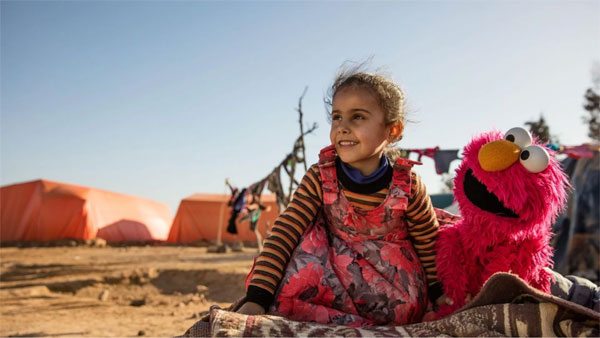
December 20, 2017; Chicago Tribune
“A proposal by Sesame Workshop and the International Rescue Committee (IRC) to educate Middle Eastern refugee children is the winner of the MacArthur Foundation’s largest-ever grant, a $100 million prize awarded under the 100&Change label,” Steve Johnson reports in the Chicago Tribune.
Johnson notes that the money will be “dispensed over five years…and is aimed at addressing development needs that would otherwise be unmet in children displaced by the ongoing crisis in Syria, especially.” MacArthur President Julia Stasch informed Johnson that the Sesame/IRC proposal won out because of “our sense of the extreme immediacy of the problem coupled with the absolute scarcity of resources to address it.”
The announcement, Johnson explains, marks “the culmination of a more-than-year-long process” that began in June 2016. Originally 1,904 proposals were submitted, of which 801 advanced to a second round and were scored by a panel of judges.
The proposal developed by Sesame Workshop and the International Rescue Committee is listed on MacArthur’s website and consists of three key elements:
- Mass Media: a locally produced television program, broadcast and made available on digital platforms, will reach 9.4 million children in Iraq, Jordan, Lebanon, and Syria, with engaging characters with whom children can learn and relate;
- Home: a caregiving program will be delivered through home visits and mobile messages; and
- Center: an early learning program will be delivered in community and NGO centers and government preschools, providing teachers with digital and print lesson plans and educational content. The Home and Center components will marshal frontline service professionals to serve 1.5 million of the most vulnerable children.
Jeff Dunn, CEO of Sesame Workshop, says that, “Our program will be life-changing for millions of Syrian children and their families, and this award is a recognition of the urgency and need to give refugee children a path forward.” David Miliband, president and CEO of IRC, said the grant would “bring hope and opportunity to a generation of refugee children.”
Sign up for our free newsletters
Subscribe to NPQ's newsletters to have our top stories delivered directly to your inbox.
By signing up, you agree to our privacy policy and terms of use, and to receive messages from NPQ and our partners.
As NPQ’s Anna Berry noted in October, Sesame Workshop has launched a similar program in the US called Sesame Street in Communities. The US program aims “to reach 4.5 million children under age 6 and their families [and] connect with more than 11,000 direct service providers,” in order to help children cope with traumatic experiences stemming from adverse childhood experiences, such as domestic violence or a natural disaster.
Both the Syrian program and the US program are based on the supposition that “Children are remarkably resilient, and the effects of traumatic experiences can be lessened if they receive comfort and support.”
The other three finalists were Catholic Relief Services, which proposed an initiative to support children in orphanages; a proposal by HarvestPlus to boost staple crops in Africa as a means to eliminate “hidden hunger”; and a proposal by Rice University’s Rice 360º Institute for Global Health to develop and deploy medical devices to boost newborn survival rates in Africa.
Johnson reports that, “Each of those programs will receive $15 million over five years…a surprise addition to the competition purse.” Stasch adds, “When faced with the choice among four really compelling solutions, we wanted to make sure we sent a message [and] signal our confidence in each of them.” Cecilia Conrad, managing director for the program, noted that the finalists who missed out on the big prize were still pleased with the $15 million award. One group told Conrad, “You don’t get a $15 million grant call every day.”
This past September in NPQ, Conrad identified four criteria that governed MacArthur’s process—to wit, the selected proposal had to be “meaningful, verifiable, feasible, and durable.” “Meaningful” meant tackling a significant problem. “Verifiable” meant there was evidence that the program intervention would work—in other words, MacArthur aims to scale up existing solutions, not test new ones. “Feasible” was an assessment of the quality of the implementation team, a criterion similar to the assessment of “character” in bank underwriting. “Durable” was perhaps the squishiest category. It meant, however, that program design needed to create a strategy for reducing reliance on philanthropic support after the 5-year grant expires.
This round marks the first round of the MacArthur $100 million grant competition, but it won’t be the last. MacArthur plans to run a new competition every three years. Information about the next round, the foundation has indicated, will be made available in late 2018.—Steve Dubb













